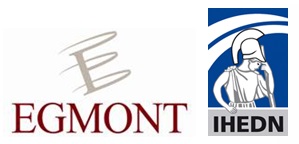Brexit and the Power of Europe: Which strategy? Le Brexit et la puissance de l’Europe: quelle stratégie?

Date
13 June 2019
Location
Egmont Palace, Place du Petit Sablon 8bis, 1000 Brussels
FULLY BOOKED
Will Brexit diminish Europe’s power? In a world of renewed great power rivalry, this is a crucial question. At their annual joint conference, Egmont and the Institute of Higher National Defence Studies (IHEDN) propose to assess the consequences of Brexit for Europe’s position in the world.
Panel 1 will look at grand strategy. Brexit certainly creates opportunities for other powers to drive a wedge between the United Kingdom and the European Union, thus weakening Europe as a whole. In an age of great powers, Europeans can only hope to have influence if they unite in order to achieve the same scale as the other powers. Can the EU involve the UK in its strategy and foreign policy? What space is there for an independent British foreign policy?
Panel 2 will focus on defence. In the military field it is even more obvious that Europeans need to pool efforts in order to increase their capabilities. If Brexit may have created the momentum to take new important steps in CSDP (notably PESCO and the EDF), how does it affect the chances of success of these initiatives? And what will be the impact on NATO and the territorial defence of Europe? In this area too, the question is whether the UK can remain involved in EU initiatives.
******
Le Brexit va-t-il ébranler la puissance de l’Europe ? Dans un monde où la rivalité entre grandes puissances est certaine, cette question est cruciale. Ainsi, lors de leur conférence annuelle conjointe, Egmont et l’Institut des Hautes Etudes de Défense Nationale (IHEDN) proposent d’évaluer les conséquences du Brexit vis-à-vis de la place qu’occupe l’Europe dans le monde.
La première table-ronde se penchera sur les enjeux géopolitiques. Le Brexit crée, pour nombre de puissances, une opportunité, de creuser un fossé entre le Royaume-Uni et l’Union européenne, affaiblissant ainsi l’Europe dans son ensemble. À l’ère des grandes puissances, les Européens ne peuvent espérer avoir de l’influence et peser sur la scène internationale qu’en s’unissant. De quelle manière l’UE pourrait-elle impliquer le Royaume-Uni dans sa stratégie et sa politique étrangère après le Brexit ? Et quelle est la marge de manœuvre britannique pour une politique étrangère indépendante ?
La seconde table-ronde se concentrera plus précisément sur les aspects de défense. Dans le domaine militaire, la nécessité, pour les Européens, de conjuguer leurs efforts pour accroître leurs capacités, est encore plus évidente. Si le Brexit a pu créer l’élan nécessaire pour franchir de nouvelles étapes importantes dans le cadre de la PSDC (en particulier la PESCO et le Fonds européen de la défense), les perspectives de réussite de ces initiatives sont-elles remises en cause par le Brexit ? Par ailleurs, quel sera l’impact sur l’OTAN et la défense territoriale de l’Europe ? Dans ce domaine également, la question est de savoir si le Royaume-Uni demeurera impliqué dans les initiatives de l’UE.
PROGRAMME
09.00–09.30 Welcome & introduction
- Sven Biscop, Director Europe in the World Programme, Egmont Institute
- Odette Tomescu-Hatto, deputy-head of international activities, IHEDN
09.30–11.00 Panel 1
Chair: Charles de Marcilly, Advisor, European Political Strategy Centre (EPSC)
- Dr. Julie Smith (Baroness Smith of Newnham), University of Cambridge, Member of the House of Lords International Relations Committee
- Dominique David, Advisor to the president, Institut français des relations internationales (IFRI)
- Dr. Sven Biscop, Egmont Institute & Ghent University
11.00–11.30 Coffee break
11.30–13.00 Panel 2
Chair: Prof. Dr. Alexander Mattelaer, Egmont Institute & Vrije Universiteit Brussel
- Bastian Giegerich, International Institute for Strategic Studies (IISS), London
- Brigadier-General Yvan Gouriou, EU Military Committee
- Brigadier-General Heinz Krieb, EU Military Staff
With simultaneous translation.